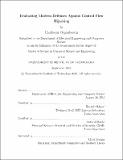Evaluating modern defenses against control flow hijacking
Author(s)
Otgonbaatar, Ulziibayar
DownloadFull printable version (915.3Kb)
Other Contributors
Massachusetts Institute of Technology. Department of Electrical Engineering and Computer Science.
Advisor
Hamed Okhravi and Howard Shrobe.
Terms of use
Metadata
Show full item recordAbstract
Memory corruption attacks continue to be a major vector of attack for compromising modern systems. Strong defenses such as complete memory safety for legacy languages (C/C++) incur a large overhead, while weaker and practical defenses such as Code Pointer Integrity (CPI) and Control Flow Integrity (CFI) have their weaknesses. In this thesis, we present attacks that expose the fundamental weaknesses of CPI and CFI. CPI promises to balance security and performance by focusing memory safety on code pointers thus preventing most control-hijacking attacks while maintaining low overhead. CPI protects access to code pointers by storing them in a safe region that is isolated by hardward enforcement on 0x86-32 architecture and by information-hiding on 0x86-64 and ARM architectures. We show that when CPI relies on information hiding, it's safe region can be leaked and thus rendering it ineffective against malicious exploits. CFI works by assigning tags to indirect branch targets statically and checking them at runtime. Coarse-grained enforcements of CFI that use a small number of tags to improve the performance overhead have been shown to be ineffective. As a result, a number of recent efforts have focused on fine-grained enforcement of CFI as it was originally proposed. In this work, we show that even a fine-grained form of CFI with unlimited number of tags is ineffective in protecting against attacks. We show that many popular code bases such as Apache and Nginx use coding practices that create flexibility in their intended control flow graph (CFG) even when a strong static analyzer is used to construct the CFG. These flexibilities allow an attacker to gain control of the execution while strictly adhering to a fine-grained CFI.
Description
Thesis: M. Eng., Massachusetts Institute of Technology, Department of Electrical Engineering and Computer Science, 2015. This electronic version was submitted by the student author. The certified thesis is available in the Institute Archives and Special Collections. Cataloged from student-submitted PDF version of thesis. Includes bibliographical references (pages 65-70).
Date issued
2015Department
Massachusetts Institute of Technology. Department of Electrical Engineering and Computer SciencePublisher
Massachusetts Institute of Technology
Keywords
Electrical Engineering and Computer Science.